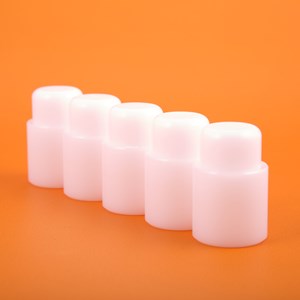Material Overview
PTFE
What is PTFE?
PTFE is made up of Fluorine and Carbon atoms. The Fluorine atoms are just the right size to form a helical shield around the carbon atoms. This stops any chemical attack on the carbon atoms because nothing can get close enough. Fluorine is an extremely reactive element and by this virtue the chemical bond between it and carbon is one of the strongest bonds known in organic chemistry. This is why only under extreme conditions can PTFE be attacked. The forces between polymer chains are extremely small which gives PTFE its excellent low coefficient of friction.
At Fluorocarbon
We manufacture PTFE semi-finished products including rod, tube and sheet by extrusion and compression moulding. In addition to this we machine and mould finished components for a range of industries including Aerospace, Semi-conductor, Petrochemical and Oil and Gas. We ensure the highest quality materials by mechanical property testing. All our materials are tested on site to International Standards so we can maintain a consistent quality product without impacting on lead times.
Our semi-finished capacity and capability
- Extruded Rod 6mm - 140mm Ø up to 4000mm length
- Extruded Tube 15mm – 150mm Ø up to 4000mm length
- Moulded Rods 3mm – 50mm Ø up to 2000mm lengths
- Moulded Rods 1mm – 1500mm Ø at various lengths
- Moulded Tubes 20mm – 1500mm Ø at various lengths
- A unique special process to produce lengths of 2000mm of low stress material for high precision machining within a narrow tolerance band
- Skived Tape: 0.1 mm to 6 mm thick to a maximum width of 1220 mm.
- Moulded Sheets: 8 mm to 100 mm thick to a maximum size 1200 mm square.
- Self-Adhesive Backed Tape (Fluoroetch® SAtm): Four standard thicknesses; 0.13mm, 0.25mm, 0.40mm, 0.50mm
- Dimpled Sheets: 3.0mm, 4.5mm, 5.0mm thick and up to 1220 square
- Fluoropack® PTFE/Cork Laminate: 2.5mm thick and 600 x 1200mm – for blister pack tools
- PTFE Coated Glass Cloth: 1000 mm wide rolls or slit to customers' requirements.
Beneficial Properties
- Superior chemical resistance
- Low coefficient of friction
- Near zero stick/slip force
- Wide temperature range
- Low moisture absorption
- High electrical resistance
- FDA approved grades available
Applications
- Aerospace equipment
- Semiconductor equipment
- Petrochemical plant
- Pharmaceutical plant
- Corrosive chemical plant
- Valve seats
- RF & microwave antenna use
- High voltage applications
Typical Physical Properties
These are mean values and can be altered by material source and process. These represent only a small percentage of standard blends available.
| FL100 | FL105 | FL115 | FL200 | |
| Testing to EN ISO 13000-2 | Virgin PTFE | 25% Glass Filled |
25% Carbon Filled |
Modified PTFE |
| Specific Gravity | 2.13 | 2.21 | 2.09 | 2.16 |
| Tensile Strength MPa | 25 | 16 | 13 | 32 |
| Elongation % | 250 | 150 | 100 | 450 |
| Hardness D | 55 | 65 | 64 | 60 |
| Use | General Chemical Use | Bearings & Valve Seats | Seats & Valve Seats | Diaphragms & Electrical |











